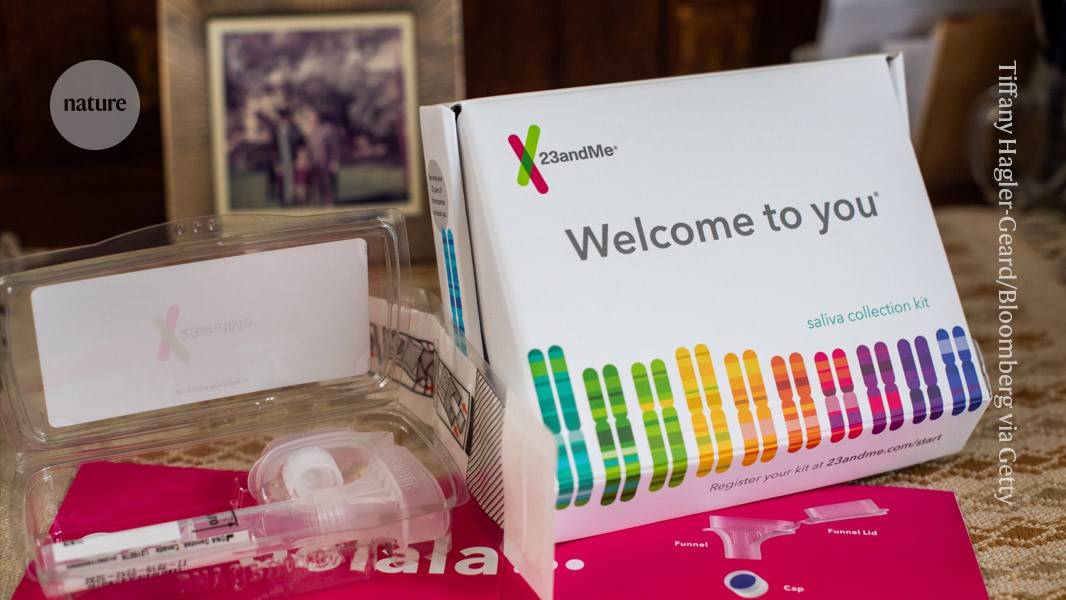23andMe plans to sell its huge genetic database: could science benefit?

Following the firm’s bankruptcy, researchers hope that they will be able to continue accessing the valuable data set even if it is sold to new owners

23andMe created a massive database of people’s DNA by selling kits to customers who want to find out their genetic roots.Credit: Tiffany Hagler-Geard/Bloomberg via Getty
Once a darling of Silicon Valley, the consumer-genomics company 23andMe has filed for bankruptcy and legal permission to auction off its assets — including its vast genetic database, which includes DNA information from around 15 million people worldwide and has powered more than 250 scientific studies.
The move to sell the information is prompting fears over how individuals’ genetic data might be used under new ownership, as well as uncertainty for scientists who work with 23andMe. But some researchers say that science could benefit if a buyer were to seize the opportunity to optimize access to data for research.
The potential sale of the data set represents a big moment for the consumer-genetics movement. “As far as I know, this is the most amount of genetic data that is potentially changing hands,” says bioethicist Anya Prince at the University of Iowa in Iowa City.
Researchers, who use the company’s data to investigate the genetics underlying certain traits, are hopeful that a new owner will continue to offer access to the information — one of the world’s biggest genomic data sets. “If a future buyer is not interested in research collaborations, it would be a great shame that the potential this data holds for human health advances would not be realized,” says geneticist Rachel Freathy at the University of Exeter, UK, whose planned collaboration with 23andMe into genetic links to birth weight and gestation length was cancelled in January because of company lay-offs.
Truth in saliva
23andMe, founded in 2006 in Sunnyvale, California, charges customers to extract and analyse their DNA from a mailed-in saliva sample. The analysis produces information about ancestry, family traits and potential health risks — and around 80% of customers consented to have their genetic information used for research. But in recent years, the firm’s business model has faltered.
The announcement of the proposed sale on 23 March prompted attorney-generals in several US states to issue ‘consumer alerts’ detailing how consumers could download their data and delete their 23andMe accounts to safeguard their personal information.
Bioethicists say it’s difficult to say how much of a risk the sale poses. “We don’t have to freak out yet,” says bioethicist Amy McGuire of Baylor College of Medicine in Houston, Texas. However, for customers uncomfortable with not knowing who is going to own their data, the safest option is for them to delete their accounts, she says.
One concern is that a change in ownership could result in insurance companies or law-enforcement agencies gaining access to customer data, neither of which are permitted by 23andMe’s current privacy policy, with an exception for law enforcement if they have a search warrant, subpoena or court order.
23andMe says that a new owner must abide by the current privacy policy. But the policy also says the terms can be altered — this means the new company “could have the power to change data collection in a way that people wouldn't want”, says Prince.
A 2008 US federal law prevents health insurers from using genetic information to determine premiums. But life insurers in some jurisdictions might use the data as the basis for increasing premiums for those at heightened risk of genetic disease. This practice is restricted in places including the United Kingdom and Florida but not at the US federal level, says Prince.
Some fear that if law-enforcement agencies gained access to the database, they could search for matches to forensic DNA samples taken from crime scenes, leading to people who have submitted their DNA or their relatives being contacted or investigated as suspects. Such outcomes are worth taking seriously because the stakes are so high when it comes to genetic data, says Prince. “You can’t change your genetic code.”
23andMe says that a new owner can change how a customer’s data are used only with that person’s consent and that 23andMe will seek a buyer “who shares in its commitment to customer data privacy”.
Enjoying our latest content?
Login or create an account to continue
- Access the most recent journalism from Nature's award-winning team
- Explore the latest features & opinion covering groundbreaking research
or
Sign in or create an accountdoi: https://doi.org/10.1038/d41586-025-01004-3
This story originally appeared on: Nature - Author:Celeste Biever


















